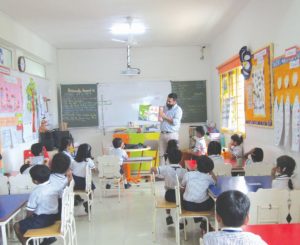 The Ministry of Skill Development and Entrepreneurship has finalized a plan for setting up 500 skill hubs and labs in government schools. In its Year End Review of 2019, the MSDE came out with the unique concept of Hubs of Excellence in Skills for school students while working closely with the CBSE.
The Ministry of Skill Development and Entrepreneurship has finalized a plan for setting up 500 skill hubs and labs in government schools. In its Year End Review of 2019, the MSDE came out with the unique concept of Hubs of Excellence in Skills for school students while working closely with the CBSE.
The MSDE will introduce high quality, technology-oriented skill programs to schools. Skill India currently engages with 9100+ schools and has integrated skills from 20 sectors. About 7.5 lakh students have already benefited from it. These initiatives are being planned in conjunction with States. The ministry is responsible for co-ordination of all skill development efforts across the country, building the vocational and technical training framework, skill up-gradation, building of new skills, and innovative thinking.
To bring a certain standard and stature in terms of quality and quantity to skills, MSDE recently announced setting up of the Indian Institute of Skills (IIS) in Mumbai which would be to the stature and repute of IIMs and IITs of the country. This project is in partnership with the Tata Group, with over 4.5 acres of land provided by the Government. The Tata Group will invest around 300 crores and on completion; IIS will have a capacity of training 5,000 trainees every year.
Increasing reach
In the Year End Review-2019, the NSDM claimed that the about one crore youth are being imparted skills training annually under various programs of the Government. The total number of Industrial Training Centres (ITIs) increased by 12 per cent from 11964 in 2014 to 14939 in 2018-19. The trainee enrolment has increased by 37 per cent from 16.90 Lakh to 23.08 Lakh during the period. Similarly under the Pradhan Mantri Kaushal Vikas Yojana about 87 Lakhs youth have been trained till date. About 681 centres had been established to train over 18 Lakh candidates. Training has been imparted to 9,89,936 candidates, 8,85,822 assessed, 7,40,146 certified and 4,35,022 candidates have been placed successfully.
The Recognition of Prior Learning (RPL) was launched to recognize the prior skills acquired by Individuals and more than 26 lakh people have been oriented under the RPL program. Under the Best in Class Employer category of RPL, more than 11 lakh employees have been oriented into formal skilling with the assistance of companies. The BFSI (Banking, Financial Services & Insurance) Sector Skill Council under MSDE has entered into a MoU with India Post Payments Bank to certify 1,70,000 Grameen Dak Sewaks under RPL Best in Class Employers.
Catch them young
Under the PM-YUVA scheme, a pilot project is being executed in 300 institutes including in 200 Industrial Training Institutes and 50 Polytechnics across Delhi, Uttar Pradesh, Tamil Nadu, Puducherry, Telangana, Kerala, West Bengal, Bihar, Assam, Meghalaya, Uttarakhand and Maharashtra.
The project aims to promote entrepreneurship as an alternative career choice and the pilot project is expected to reach out to around 70,000 youth through entrepreneurship awareness and education sessions. The project is likely to create 600 new and 1000 scale-up enterprises by March, 2020. A MoU has been signed with Cisco, Quest Alliance and Accenture to train youthacross India enrolled in industrial training institutes(ITIs) in digital literacy, career readiness, employability skills, and advanced technology skills such as data analytics.
The MSDE has also launched the Skill Saathi program which was aimed to sensitize the youth of the country on various avenues under Skill India Mission and increase the aspiration for skill development. Close to 40 lakh students were counseled under the program. Then an embedded apprenticeship degree program has been rolled out in retail, media and logistics embedded into degree programs such as BA/BSc/BCom.
About seven lakh apprentices will be trained in one year, which if converted will almost double the number of apprentices trained over the last amendment made to the Apprenticeship Act of 1961. MSDE is also promoting Third Party Aggregators (TPAs) who will be key catalysts for promoting apprenticeship training, which is one of the most sustainable form of skill development.
A Memorandum of Understanding has been signed with the SBI for engagement of 5000 apprentices as banking front office executive and tele-callers in the current financial year 2019-20, as part of an initiative to launch partnerships for promotion of apprenticeship in the financial sector. The ministry is also developing a skill vouchers program for micro, small and medium enterprises (MSME), as a provision model to enhance the delivery and quality of the programs. Vouchers will be provided to learners and entrepreneurs towards the training program they see most value in.
The 22 winners of IndiaSkills 2018 and their experts had represented the country with their outstanding performance at the WorldSkills International 2019 (WSK), held in Kazan, Russia. India won one gold, one silver, two bronze and 15 Medallions of Excellence at the biggest competition for skills. India ranked 13th among 63 countries that participated at WorldSkills International 2019, marking it to be the best finish for the country in the coveted skill championship. They were felicitated with certificates and cash prizes for their remarkable performance.
Reforms
The ministry has introduced a wide range of reforms to the Apprenticeship Act of 1961, to make it significantly easier for industry to take on much needed apprentices. The comprehensive reforms under Apprenticeship rules include increasing upper limit for engaging apprentices from 10 per cent to 15 per cent; decreasing the size limit of an establishment with mandatory obligation to engage apprentices from 40 to 30; payment of stipend for first year has been fixed rather than linking it to minimum wages; 10 per cent to 15 per cent hike in stipend for 2nd and 3rd year to apprentice and duration of apprenticeship training for optional trade can be from 6 months to 36 months.
The ITIs Dual System Training (DST) scheme is likely to be introduced in at least 1000 ITIs. The DST is a model of training inspired by the German method and provides industry exposure through industry led trainings to students of the various ITIs. In the first 100 days, 40 National Skill Training Institutes (NSTIs) have signed partnership agreements and 739 MoUs have been signed. The duration of the practical training portion of the course has also been made flexible and adaptive to the industry schedule. All the 138 plus courses under CTS have been brought under the ambit of DST, as against only 17 courses earlier. ITIs are exclusively permitted to conduct training under DST with deemed affiliation in the 3rd shift.
In a bid to keep up with the times, the ministry has also launched new age courses in 12 NSTIs. These include Internet of Things — Smart Healthcare; Internet of Things — Smart cities; 3D printing; Drone pilots; Solar Technicians and Geo Informatics among many others. To get to the grass roots of the country with its various reforms and empower every citizen, the ministry has formed District Skill Committees (DSC) in all Districts as part of its Aspirational Skilling Abhiyaan under the Sankalp program, which is funded by World Bank. The MSDE is handholding these District Skill Committees through the Directorate General of Training (DGT) to further identify skill gap at a local level and then strengthen the ecosystem for local market driven skill development opportunities.
The MSDE has also constituted the Mahatma Gandhi National Fellowship (MNGF) for 75 districts across 6 states. Under these 75 young professionals shall be selected and will be deputed in identified 75 districts for supporting the district officials in district level planning, monitoring of activities related to skilling’ management of data/information, coordination among different stakeholders in districts’ assistance to District Skill Development Committee.
ISDS kick started
 Indian Skill Development Services (ISDS) have been introduced to ensure that the skilling of the country’s youth gets the importance that it deserves, the government has carved out an altogether new administrative service much like the Indian Revenue Service or the Post and Telegraph Service. The Indian Skill Development Services (ISDS) has been created through a notification by the MSDE. This service has been created for the Training Directorate of the Ministry of Skill Development and Entrepreneurship. ISDS will be a Group ‘A’ service where induction will take place through Indian Engineering Service Examination, conducted by UPSC.
Indian Skill Development Services (ISDS) have been introduced to ensure that the skilling of the country’s youth gets the importance that it deserves, the government has carved out an altogether new administrative service much like the Indian Revenue Service or the Post and Telegraph Service. The Indian Skill Development Services (ISDS) has been created through a notification by the MSDE. This service has been created for the Training Directorate of the Ministry of Skill Development and Entrepreneurship. ISDS will be a Group ‘A’ service where induction will take place through Indian Engineering Service Examination, conducted by UPSC.
The fresh batch of the newest central government services, the Indian Skill Development Services commenced their training program at the Administrative Training Institute (ATI), Mysuru on September 9, 2019. The Indian Skill Development Service (ISDS) has 263 All India posts. The cadre comprises of 3 posts at Senior Administrative Grade, 28 posts at Junior Administrative Grade, 120 posts at Senior Time Scale and 112 posts at Junior Time Scale.
Based on the learning from various schemes and programmes introduced for women’s entrepreneurship promotion, National Institute of Entrepreneurship and Small Business Development (NIESBUD) in association with UNDP and other agencies jointly developed a new concept and system that is providing mentorship support services of both psycho-social and business supports through a cadre of community mentors called Business Sakhis (Biz-Sakhis). The curriculum was released on November 9, 2019 on the occasion of the National Education Association (NEA) ceremony. These mentors will provide backward (with financial institutions for example) and forward with more lucrative business ideas and market linkages.
Moreover, the mentor will provide the aspiring entrepreneur with the much-needed psychological support that a woman will need to face all the obstacles that prevent her from starting or sustaining her own business. They act as community-based business consultants for enterprise development.
The curriculum for five days Train the Trainer (TOT) programmes for the faculty of ITI was developed and the Trainers Training programmes on employability, entrepreneurship and life skills are designed and organized for 4068 trainers at pan-India Level. The institute has organized the Entrepreneurship Development programmes for the most-needy skilled unemployed youth from OBC/SC/ST/Manual Scavengers and women.
An MIS portal was launched for Jan Shikshan Sansthans (JSS). The benefits from the adoption and implementation of the solution have been enhanced monitoring & management capabilities, along with scaling up scheme operation. The ministry now plans create a JSS setup in every district in the country.
The eSkill India platform
In a technology driven environment, e-learning is pivotal in deepening the reach of skilling opportunities for the Indian youth. NSDC created an e-Skill India, a multilingual e-learning aggregator portal, providing e-skilling opportunities to the Indian youth. eSkill India leverages the skilling opportunities from Indian and global leaders in online learning, by consolidating online courses curated by leading knowledge organizations that share NSDC’s commitment of making India a Skill Capital of the World.
The eSkill India provides anytime, anywhere skilling — beyond the boundaries of location and time. Today, eSkill India has onboarded organizations such as TCS, BetterU, IBM, SAS, BSE, Apollo Medvarsity, Enguru, Amrita Technologies, iPrimed, Wadhwani Foundation, English Edge, Fair and Lovely, AIFMB, etc. offering high-quality courses in diverse sectors such as Agriculture, Healthcare, Telecom, Employability, Management, Retail, Pharma, Banking and Finance, Data Science, Artificial Intelligence, etc. which enable a one stop shop to the skill seekers via a single learning platform. The courses are available in English, Hindi and 9 regional languages. The learners are guided through self-paced interactive videos and quizzes.
letters@tehelka.com













